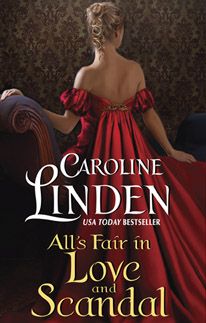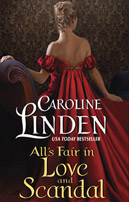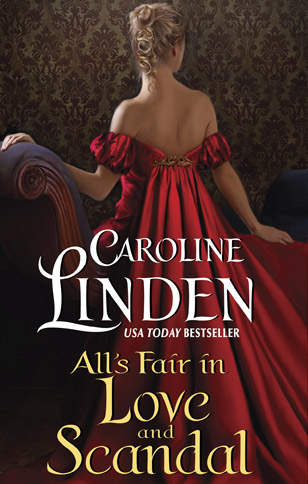 Douglas Bennet, handsome, charming and heir to a baronet, had reached the age of twenty-nine with very little in the way of adversity or disappointment.
Douglas Bennet, handsome, charming and heir to a baronet, had reached the age of twenty-nine with very little in the way of adversity or disappointment.
His life had been blessed from the start. He was the only son of Sir George Bennet, baronet. It wasn't an illustrious title, but it was an ancient one and it came with a large fortune. His mother was the daughter of a former War Secretary, and his uncle was the Earl of Doncaster, who had the King's ear. It was the best possible combination of circumstances, with impressive connections yet no onerous personal responsibility.
He was tall, with a muscular build and an abundance of good health. He was also excessively fond of sport, and was most at home in the boxing ring, with a fencing foil in his hand, or atop a fast horse. Not even a taste for spirits kept him from being trim and strong to a degree other men envied. In addition, he was a handsome fellow, with thick auburn hair and hazel eyes, and possessed a good-humored charm that made him popular with other men and a great favorite among the ladies.
Even his main fault sprang from all these advantages. With his life comfortable and privileged in nearly every regard, Douglas was bent on adventure and excitement. As a boy he was constantly getting into trouble, immune to his mother's lectures on proper behavior or any punishment she imposed. As a youth he became known for his pranks; nothing was too daring or outrageous for him to attempt. By the time he was a young man, it was wagering, on anything that offered a good contest. After one significant loss, his father had taken him on a tour of the Fleet Prison, where debtors went, and told him frankly that the Fleet was his future if he didn't show some restraint. After that Douglas took care, but only to the point of never wagering more than he could afford to lose. Thanks to his generous allowance, to say nothing of good luck, this had only a slight impact on his activities.
For nearly eighteen years his most frequent companion in all this hell-raising good fun had been Tristan Burke. They'd met as boys at school and recognized each other as kindred spirits at once. Burke was, quite simply, the best mate an adventurous boy could want. He was bold, daring, unfettered by propriety, willing to wager on anything, and had a wicked sense of humor and fun that only improved with age.
At times Douglas envied him fiercely. His friend's parents had died when he was a child, and Burke had come into his enormous inheritance at the age of twenty-one, with no limits or oversight. Douglas didn't envy Burke's lack of family, much—only when his mother started prodding him to marry, or his sister barged into his house and rousted him from bed at an ungodly hour of the morning—but he rather fancied the idea of being completely free. However much he might deny it, Douglas knew in his heart he'd have to settle down one day. It would kill his mother and deeply disappoint his father if he didn't, and Douglas was too fond of his parents to do that. Still, he planned to put it off for as long as possible, and certainly as long as Burke did.
It was nothing less than a thunderous shock when Tristan Burke abruptly got married—to Douglas's sister Joan, of all people. Douglas had been away from town when he got the news, and at first he didn't believe it. Not that Joan would marry; he knew she wanted to be married, and that his mother had begun to despair of finding her a husband. Joan was tall for a girl and she could be very impertinent, especially when she decided to tease him. But Burke had called Joan a Fury mere weeks before he stood up beside her in the church and pledged himself to her for better or for worse. Despite Douglas's suspicions that something scandalous must have forced Burke into it, he couldn't determine what. His parents refused to speak of it, and Burke just grinned. In fact, Burke looked pleased. And instead of spending his nights tearing through London, he stayed at home with Joan.
Douglas had other friends, but none of them had Burke's audacity, his humor, his energy. He couldn't say he was sorry to have Burke for a brother-in-law, but he was very sorry to have lost such a jovial companion. Not having Burke around, ready with a sly comment or wager, took some of the verve out of his usual rakish activities.
 "Well, well, back to your usual haunts," drawled William Spence one evening as Douglas strolled through a ballroom in search of amusement but finding himself at loose ends.
"Well, well, back to your usual haunts," drawled William Spence one evening as Douglas strolled through a ballroom in search of amusement but finding himself at loose ends.
"I was away from town." He propped one shoulder against the wall. "It's dashed quiet tonight." It was. The card room was filled with old women and timid men playing for shilling stakes. Aside from Spence, he didn't see any of his normal companions. First Burke, now everyone else of spirit had abandoned him. Perhaps he should just go to a gaming hell for the rest of the evening.
"Ghastly dull," concurred Spence languidly. "I don't know why I come to these parties."
"There's always the wine." He lifted a glass from a passing footman's tray and raised it in salute.
Spence clicked his tongue. "So tame! Not like the courageous man of adventure I once knew."
He laughed. That was Spence's way of goading someone into a prank or wager. "Adventure! In Lady Creighton's ballroom?"
"Just because it's quiet tonight doesn't mean there's no sport to be had." Spence tilted his head and nodded toward a distant corner of the room. "There, for instance. A lovely woman, standing and watching others, far less beautiful than she, dance and be merry."
Douglas looked at the woman in question and felt a flicker of surprise. For once Spence was right. She was a beauty, no question, and yet she seemed isolated and alone. "Who is she?"
"Madeline Wilde." Spence watched him expectantly, but Douglas had never heard of her and only shrugged. A thin smile spread over the other man's face. "An unusual woman. A widow, of course. She comes to all the best society events but never dances. No one quite knows if she's made of ice, or merely too good for mortal men."
By now he was all but staring at her. Her hair shone like gold under the chandeliers, and her bosom looked plump and perfect in the deep green bodice of her low-cut gown. "Never dances? Why?"
"No one can fathom. It's become something of a challenge in certain quarters to see what will entice her. More than one fellow's lost a few guineas over her."
His pulse jumped. Dance with such a woman and win a contest? He was helpless to resist. "I wager I could persuade her," he murmured, his eyes tracing the slope of her bared shoulder.
"Five pounds says you shan't," said Spence at once.
"Done." Douglas tugged his jacket straight and winked at his friend. "I'll expect it in coin tomorrow." And he sauntered off through the crowd, looking forward to making her acquaintance.



 Douglas Bennet, handsome, charming and heir to a baronet, had reached the age of twenty-nine with very little in the way of adversity or disappointment.
Douglas Bennet, handsome, charming and heir to a baronet, had reached the age of twenty-nine with very little in the way of adversity or disappointment.
 "Well, well, back to your usual haunts," drawled William Spence one evening as Douglas strolled through a ballroom in search of amusement but finding himself at loose ends.
"Well, well, back to your usual haunts," drawled William Spence one evening as Douglas strolled through a ballroom in search of amusement but finding himself at loose ends.

